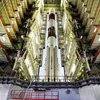ISRO successfully launches RISAT-2BR1, 9 foreign satellites
The ISRO team placed RISAT-2BR1 into orbit around 16 minutes after lift-off, while the remaining satellites were released into their respective orbits about five minutes after.
ISRO on Wednesday successfully injected into orbit the country's remote imaging earth observation satellite RISAT-2BR1, along with nine other foreign commercial satellites.
The 44.4-metre tall PSLV lifted off majestically with a thunderous sound, leaving plumes of smoke behind, from the first launch pad at the spaceport here at 3.25 pm.
RISAT-2BR1 was placed into orbit around 16 minutes after the lift-off, while the remaining satellites were released into their respective orbits about five minutes later.
ISRO Chairman K Sivan and other scientists greeted each other as all 10 satellites were injected into the desired orbits.
Later, speaking from the Mission Control Centre, Sivan said today's mission was a 'historic' one, coinciding with PSLV's 50th flight. "ISRO has made a historic mission... I am extremely happy to declare that the 50th PSLV vehicle successfully injected RISAT-2BR1 precisely into the 576-km orbit," he said.

Image: ISRO
RISAT BR1 was a "complex" satellite but was built in a short time, he added, and lauded the team behind the effort. Terming the mission a great success, he recalled and acknowledged the contribution of "exemplary leaders" like Dr Srinivasan, Dr Madhavan Nair, and others, from the conceptualising-configuration stage to date.
Dr Nair had made the vehicle operational, he pointed out. PSLV's payload capacity had increased from 860 kg to 1.9 tonnes, and the "versatile vehicle" has carried 52.7 tonnes so far, 17 percent of which was customer satellites, he said.
On future missions, Dr Sivan exuded confidence that team ISRO would as usual rise to the occasion and make them all a "grand success."
The 628-kg remote imaging earth observation satellite RISAT-2BR follows RISAT-2B, which was placed successfully in orbit in May this year.
As many as nine other satellites — six from the US and one each from Israel, Italy, and Japan — rode piggyback on PSLV-C48. The satellites were launched under a commercial arrangement with NewSpace India Ltd.

Preparation prior to the launch (Image: ISRO)
Of the 50 missions to date, 48 have been successful for ISRO. The PSLV had placed around 310 foreign satellites with the first mission in September 1993. Some significant launches by the PSLV include Chandrayaan-1, Mars Orbiter Mission (MOM), and the record launch of 104 satellites in one go.
PSLV-C48 is the second flight with 'QL' configuration equipped with four strap-on motors on its sides, ISRO said. The first flight with a similar configuration was launched in April 2019 (PSLV-C45/EMISAT and 28 other satellites).
Apart from being used for military purposes, the key applications of RISAT-2BR1 include agriculture, forestry, and disaster management support. While the six satellites from the US would be used for multi-mission remote sensing purpose, the one launched by Italy was aimed at taking up search and rescue efforts.
A radar imaging earth observation satellite built by Japan and another by Israel were also launched. The mission life is five years, ISRO said.
The launch of PSLV-C48/RISAT-2BR1 is the sixth launch by ISRO in 2019.
(Edited by Athirupa Geetha Manichandar)










